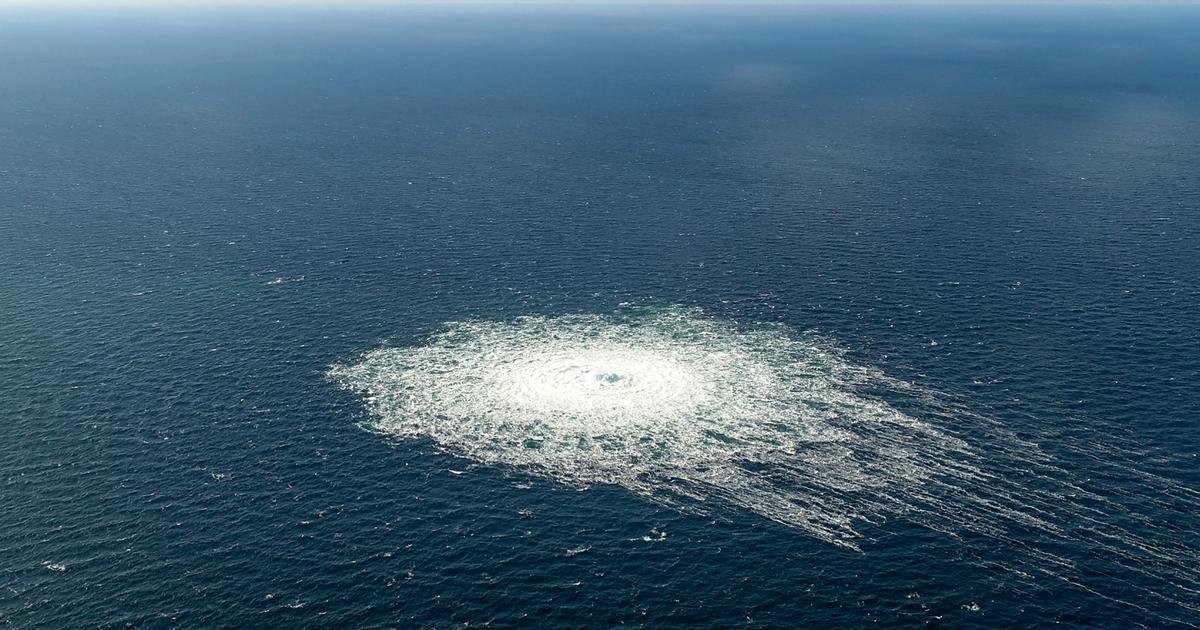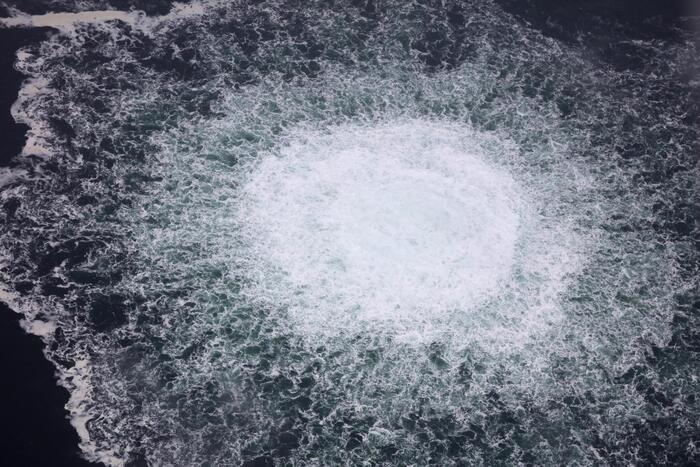Oil pipelines, gas pipelines, submarine data cables.
Crucial energy and telecommunications infrastructures for countries have also become critical points for possible attacks, and more so in a context marked by Russia's war in Ukraine and other global threats.
Now, after the sabotage of the Nord Stream gas pipelines last September in the Baltic Sea, which caused the explosion of pipelines and an environmental disaster, NATO has launched a cell that will review and monitor these types of facilities in allied countries.
The cell, which will try to make infrastructures more secure and weave networks that deter possible attacks, will be led by the retired German soldier Hans-Werner Wiermann and will try to coordinate the industry,
"The sabotage of the Nord Stream gas pipelines has reminded us all of the vulnerabilities we face," stressed the head of the Atlantic Alliance at a press conference after the meeting with the defense ministers of the allies in Brussels, in which the creation of the cell has been agreed.
NATO warns about the vulnerability of these infrastructures and about the impact that attacks and sabotage such as the one that occurred in the Russian gas pipeline —after which the first investigations see the hand of a "state actor"— may have not only on the security of the allies, broadly speaking, but in the daily life of its citizens and the world economy: more than 90% of global digital communications flow through submarine cable networks, for example.
The creation of the specialized cell coincides with the intention of the European Commission to reinforce its directives on critical infrastructures to protect them from security risks, terrorist attacks or natural disasters.
Brussels has asked Member States to review the risk of their facilities.
Now the EU and NATO could cooperate in this field.
More information
Ukraine-Russia war: latest live news
The new announcement from the Atlantic Alliance comes as the controversy over the Nord Stream has returned to the fore after comments aroused by the publication of an article signed by the American journalist Seymour Hersh, which states that the attack was carried out by order. US President Joe Biden.
Hersh, citing an anonymous source, recounts that the sabotage was carried out by divers, who set up explosives in June that would later be detonated in September with Norwegian help.
The White House has branded the article as "complete fiction" and Oslo has also denied the veracity of the story, which includes, for example, the name and supposed route of several ships that, according to open data, were not there.
Sweden, Denmark and Germany have investigations into what happened in the Nord Stream because either it was in their waters or it is one of their projects, but the case is in the hands of the respective prosecutors and the investigations are still ongoing.
After the attacks, Poland and Ukraine blamed Russia, although without any evidence.
Russia, meanwhile, pointed directly at the UK;
also without evidence.
Now, the Kremlin, moreover, has jumped on Hersh's boat, has blamed Washington for the sabotage and has demanded a thorough investigation.
As in other hybrid attacks, the sabotage has not only caused the disabling of the gas pipelines (which in any case were no longer operational) and the very serious spillage into the sea,
The Nord Stream case has highlighted the relative ease of carrying out sabotage or some kind of attack in the Baltic Sea, entangled with telecommunications cables and pipes that until now have had little surveillance.
Within the new reinforcement of submarine infrastructures, NATO also wants to increase surveillance flights of these facilities on the high seas and the presence of patrol boats in the North and Baltic seas.
Norway, for example, reinforced the security of its infrastructures with more military presence after the sabotage of the Nord Stream.
tanks for Ukraine
When the new great Russian offensive in Ukraine has already begun, according to NATO, the government of President Volodimir Zelensky and the Alliance's secretary general have urged their Western allies to speed up the delivery of weapons.
Despite pleas and evidence that the Kremlin is massing tens of thousands of troops around the borders with Ukraine and in the occupied territories, and that it may even be contemplating air strikes (a variable that has played little role in in the full-scale war that is going to be one year old), the long-awaited coalition to send the Leopard 2 tanks is going slower than expected.
German Defense Minister Boris Pistorius announced Wednesday that countries have promised 48 Leopard 2 tanks for kyiv, less than the 90 expected by Berlin.
Among those 48 committed battle tanks there is a Leopard 2 A4 model tank battalion (older) whose delivery is being coordinated by Poland, 14 Leopard 2 A6 model (more advanced) from Berlin and another three from Portugal, as explained by Pistorius in Brussels, after the meeting with their Alliance counterparts.
The allies that have shown themselves willing to send tanks to Kiev want the Ukrainian military to receive training in handling the tanks first and create the entire logistical structure that accompanies the Leopards to guarantee their effectiveness on the ground, according to allied sources.
Zelensky and his Defense Minister Oleksii Reznikov, who participated in the meetings in Brussels, have also urged their partners to send them fighter jets and more air defense systems.
The aircraft debate is not really on the table yet, but the Alliance has urged increased deliveries of other heavy weapons, anti-missile defenses and, above all, ammunition.
Ukraine (also Russia) is running out of ammunition at a dizzying rate.
So much so, Stoltenberg has said, that the war has also become a race in logistics.
Meanwhile, ammunition deliveries to Ukraine have also depleted the arsenals of NATO countries, which are trying to maneuver industry contracts to replenish them.
On Wednesday, the Alliance announced that its countries are increasing production of 155-millimeter artillery rounds — a key ammunition in the ground artillery war being waged, for example, in Donbas — and that further production needs to be increased. to continue helping Ukraine.
In addition, NATO is preparing an ammunition storage project, Stoltenberg explained.
Meanwhile, the EU is also moving to try to launch more joint purchases of material, and there are proposals on the table such as that of the Estonian Prime Minister, Kaja Kallas, who proposes a common purchasing model like the one launched for vaccines against covid-19.
Meanwhile, seven European countries (the United Kingdom, the Netherlands, Norway, Sweden, Denmark, Iceland and Lithuania) have announced on Wednesday a package of direct contracts worth around 225 million euros between Ukraine and defense manufacturers to provide Kiev with artillery supplies, tank spare parts and other materials.
Germany has signed contracts with manufacturer Rheinmetall to restart production of ammunition for the Gepard anti-aircraft guns it has delivered to kyiv.
"We are facing a critical moment because of what we see on the ground in Ukraine, but also because of what we expect in the coming months," warned the Dutch Defense Minister, Kajsa Ollongren, who has warned of the consequences of a war long.
space project
At the same time that NATO reinforces its surveillance and study of critical infrastructures, especially submarines, its allies look to the sky.
For the first time, 16 member countries of the Alliance — Belgium, Bulgaria, Canada, France, Greece, Hungary, Italy, Luxembourg, the Netherlands, Norway, Poland, Romania, Spain, Turkey, the United Kingdom, the United States — together with Sweden and Finland (hoping to join in the coming months) have launched a new initiative to collect and use data from space.
The plan, which NATO describes as the largest space project in the Alliance's history, seeks to improve intelligence and surveillance and support the organization's missions and operations, according to allied sources.
The Alliance for Persistent Surveillance in Space (APSS) will create a virtual constellation of assets (state and commercial) such as satellites to collect, exchange and analyze data between allies.
Follow all the international information on
and
, or in
our weekly newsletter
.
Subscribe to continue reading
Read without limits
Keep reading
I'm already a subscriber

/cloudfront-eu-central-1.images.arcpublishing.com/prisa/B7JVAQ7KIENOVLBPUKTOANMYKE.jpg)








